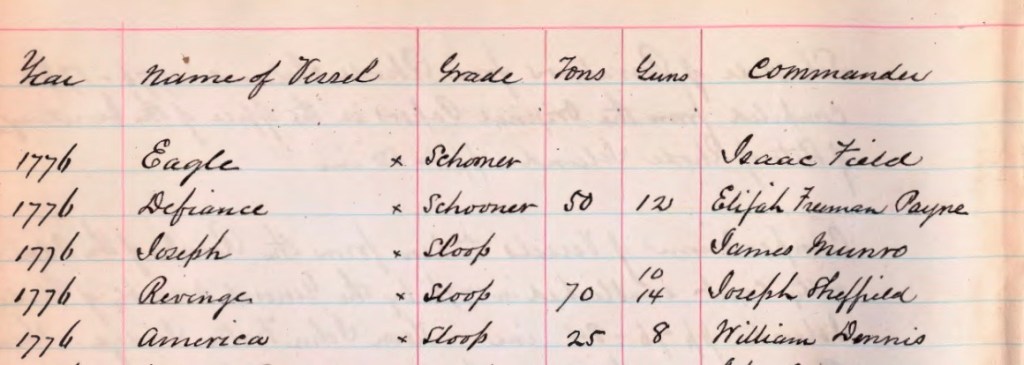By Richard and Gloria Schmidt
In 1776 the navy of Great Britain was the most powerful in the world. How could Americans compete on the seas? States outfitted some vessels of War and Congress established a navy, but it was woefully inadequate to meet the needs of the Americans. The Patriots turned to a long established practice of issuing commissions to ship owners to authorize them to attack and seize merchant ships and warships of the British. If the privateers were successful they got to keep profits from the cargo and possible sale of the vessels they seized. The proceeds would be shared by the owners and the crew. Sometimes the state or national government received a small share as well. The primary objective was to disrupt trade and encourage British ship owners to call for an end to the war.
In the archives of the State of Rhode Island is a copy of the 1776 privateer commission of Isaac Field and his ship the Eagle. We have tried to transcribe the document.

Form of a Privateering Commission 1776
That we have granted and by these points do grant and authority to Isaac Field, mariner, commander of the schooner called the Eagle of the (_) of sixty tons or there about(s) belonging to John Matthewson and others of Providence in the colony of Rhode Island and mounting ten carriage guns and (-) by sixty-five men to fit out and set forth the said schooner in a warlike manner and by and with the said schooner and the crew thereof by force of arms to attack ships and take the ships and other vessels belonging to the inhabitants of Great Britain or any of them with their tackle, apparel, furniture and loadings on the high seas in between high water and low water marks and to bring the same to some convenient ports in the said colony in order that the courts which are, or shall be there appointed to hear and determine cases civil and maritime, may process in due form to condemn the said captures if they be judged lawful prizes, the said Isaac Field having given and with sufficient sureties that nothing be done by the said schooner or any of the officers, mariners or company thereof, contrary to or inconsistent with the —-? and customs of nations, and the instructions a copy of which is herewith delivered to him and we will and require all our officers whatsoever to give succor and assistance to the said Isaac Field in the promissary this commission shall continue in force until the Congress shall issue orders to the contrary.
By order of the Congress – John Hancock, President
Dated at Providence in the state of Rhode Island and opened under my hand and the seal of the said state the twenty-seventh day of September in the year of our lord one thousand seven hundred and seventy-six Nicholas Cooke, Governor.
By his honor (_). William Mumford, Secretary
Thomas Fleming Day wrote in a Naval Journal in 1911.
“More than two hundred privateer commissions were issued by Rhode Island in the revolution, and not less than one hundred and ninety-three privateer cruises were successfully begun from Narragansett Bay. In November, 1776, John Paul Jones, when in command of the sloop of war Alfred, tried to enlist men at Newport but could get none, as they preferred privateering. The privateer Eagle, Captain Isaac Field, had sailed the day before and anchored at Tarpon Cove. Jones, sailing down Vineyard Sound, saw her, laid alongside and took twenty-four men out of her to force to make up the Alfred’s complement.”
Isaac had a short career. He later became captain of the Industry. He died in June of 1778 and is buried at Swan Point Cemetery.
Sources:
The Rudder, Edited by Thomas Fleming Day, 1911
Rhode Island Archives: List of Privateers.
https://sosri.access.preservica.com/archive/sdb%3AdeliverableUnit|bbb7b797-e39c-4afc-a1ab-b3d6e59e830b
Leave a comment